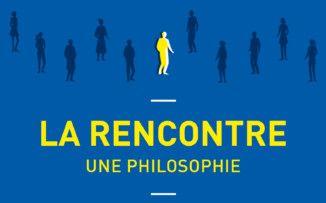What is a meeting?
How does it manifest itself and what does it imply?
Originally, from the Latin
ex-sistere
, the encounter designates the fact of “going out of oneself”.
In love, friendly or professional, it underlies the idea of a movement towards the outside, towards the foreigner and therefore, a risk.
But is this still the case?
From Plato to Christian Bobin, via Albert Cohen, Picasso, Bowie and Clint Eastwood, Charles Pépin reveals to us what is behind this famous idea of meeting in an essay entitled
La Rencontre, une Philosophie
(Allary).
What did the readers of the Figaro Reading Club think?
The editorial staff invited members of its literary group on Facebook to read the book and review it.
A beneficial reading
Claire Touffait was changed by her reading.
“The discovery of an author.
The rediscovery of philosophy.
With his principle of “I will-I see”, Charles Pépin invites us to think about and rethink the encounter, the encounters that allow us, through others, and with them, to be ourselves.
I recommend, without moderation.
This book made me want to change my habits to be more open, attentive to others and therefore, attentive to myself and the world around me, which is more than beneficial in the current context. ”
An accessible vocabulary
Florence Laurent recommends this book.
“
The Meeting
of Charles Pépin.
What a funny title for a book in this period of confinement and where people roam with their noses in their phones?
This work allows us to analyze the different phases of this moment, its field of impact and its future at the philosophical level.
Each phase of the meeting as well as its impact and its future are illustrated by literary, historical, cinematographic and of course philosophical examples.
This book uses accessible vocabulary.
The demonstration is even more telling and understandable by the examples which illustrate the words.
I loved."
A general and disjointed statement
Maëlle D. is hungry for more.
“There are joys that strike down, and the encounter is one of them,” wrote the philosopher Jean-Louis Chrétien in his essay L'Effroi du Beau (Cerf, 1987).
Charles Pépin tried to describe here "the mechanics and the power of the encounter."
If the theme is fascinating, the author does not spare us certain clichés, to evoke the romantic disorder for example.
The accounts of famous encounters are interesting, the style is fluid but the general subject is a little disjointed and is similar to a personal development guide by its injunctions.
Finally, this essay does not talk about one of the main issues of a real meeting, empathy.
It's a shame because there was a lot to say about it. ”
A very revealing book
For Cécile Metreaud Avisse, this book opens up to the world.
“The strength of the meeting is the power of the change that takes place in oneself.
Chance, evidence, invitation to travel in search of oneself.
Love, friendship, professional, religious, individuality is overwhelmed.
The gaze of the other enlightens us and opens the field of possibilities.
The confrontation of philosophical ideas shows that man can only find his identity through others.
Each meeting is a rebirth.
A very revealing book full of emblematic examples. ”
A desire to leave
Esther Villmin emerges from this book full of envy.
“Talking about encounters when for a year we have had little opportunity to do so is a happy initiative.
With examples taken from books, films or real friendships, and the support of philosophers he knows how to make accessible to us, Charles Pépin reminds us that meeting is an emotion that requires us to open up to the world and accept the 'unforeseen and the unknown.
We close this book by wanting to discover people, works, and confident in how they will change us. ”
A beautiful promise
Jérôme Langlois greatly appreciated his reading.
"Our social shell cracks, we are confused, what if this disorder becomes vertigo?
Can we build our existence without encountering otherness?
Charles Pépin opens the way for us among philosophers and anthropologists, he invites us to get out of (at) home, out of the routine: the step aside.
The meeting is an accomplishment, our past conditions us but does not determine us.
Chance, surprise, promises of beautiful encounters inhabit this book to recommend without moderation. "
Too descriptive writing
Cécile Perceau was not convinced.
“The author engages in a difficult exercise: to analyze THE encounter from a philosophical angle.
The references (books, films…) are numerous, but little searched.
Eager to cover the whole field of his theme, he is confined to a descriptive writing, too bland to translate the upheavals caused by fate - or a successful meeting.
These meetings mentioned were intended to be crucial, essential, lively, fertile ... The tone is not sufficiently swirling, enthusiastic to convince us of it. "
A sobering book
Stéphanie Talhouarne is not of the same opinion.
"With a real sense of pedagogy, a fluid writing, Charles Pépin takes us into his world, philosophy, to decipher" the meeting ".
The greatest philosophers have dealt with this subject, but he chooses to mix cinema, literature, religion and painting.
His purpose becomes accessible, contemporary and very personal.
In the digital age, without any judgment or a priori, it gives food for thought on this essential act, sometimes so fundamental in one's life. ”
Very pleasant to read
Marie-Noëlle Mazetier took lots of notes. “The meeting for dummies! What encounter is this book? A romantic, spiritual, friendly or artistic meeting, the author tells us about the situations and possible cases and above all imagines the artists who would not be who they are without a meeting. Like a kind of user manual that would be aimed at beginners of all kinds, but with literary or political or artistic references. Very pleasant to read but the reading of which does not leave indifferent and allows to put words on emotions, feelings. On the other hand, to be read with a Stabilo. "

